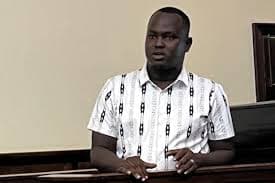We're loading the full news article for you. This includes the article content, images, author information, and related articles.
A son of Turkana Governor Jeremiah Lomorukai requested to testify in Kiswahili during an assault case in Eldoret, highlighting the practical use of national languages in Kenyan courts despite English being an official language.

An Eldoret courtroom experienced a moment of levity on Tuesday, October 21, 2025, when Lavish Lomorukai, son of Turkana Governor Jeremiah Ekamais Lomorukai, informed the court he was not fluent in English and preferred to testify in Kiswahili. Presiding Magistrate Kesse Cheronoh granted his request, which followed an insistence by the defence lawyer, Vincent Githaiga, for testimony in English.
Lavish Lomorukai is a key witness in a high-profile assault case where Turkana South MP John Ariko and seven co-accused face charges for allegedly attacking Lavish's younger brother, Nimrod Lomorukai. The incident reportedly occurred on the night of April 29, 2024, when Nimrod, a professional footballer, called his elder brother in distress, claiming he had been attacked by individuals suspected to be supporters of MP Ariko.
In his testimony, delivered in Kiswahili, Lavish recounted receiving a call from his brother around 11:00 PM EAT while hosting visitors at home. Nimrod urged him to rush to Cherina Bar and Restaurant, located a few kilometres from Lodwar town, where the assault took place. Upon arrival, Lavish stated he remained in his vehicle and observed his younger brother being beaten by several men, whom he later identified as the MP's supporters. Instead of immediately reporting to the police, Lavish drove Nimrod to a hospital in Lodwar for treatment before taking him home.
Kenya's Constitution designates Kiswahili as the national language and both Kiswahili and English as official languages of the Republic. While English has historically dominated legal proceedings, the law allows for the use of Kiswahili in subordinate courts. Article 50 of the Constitution ensures every person has the right to a fair hearing, including being informed in a language they understand. Despite this, an activist in 2023 petitioned Chief Justice Martha Koome to further embrace Kiswahili in court proceedings, noting that judges and magistrates often insist on English and record testimonies in English even when a litigant speaks Kiswahili.
MP John Ariko and his seven co-accused—Peter Lokutuni, David Nangiro, Jemostar Akooyen, Bornfestus Nabuin, Joseph Ekitela, Sammy Ekitelem, and James Abel—have all denied the assault charges. They are currently out on a cash bail of KSh 150,000 each. The prosecution has indicated that it will present over 20 witnesses in the case.
The case is set for further hearing on December 10 and 11, 2025. The proceedings will continue to shed light on the alleged assault and the dynamics of political rivalries in the region. The use of Kiswahili in court, as requested by the witness, may also spark further discussion on language policy implementation within the Kenyan judiciary.
Keep the conversation in one place—threads here stay linked to the story and in the forums.
Sign in to start a discussion
Start a conversation about this story and keep it linked here.
Other hot threads
E-sports and Gaming Community in Kenya
Active 9 months ago
The Role of Technology in Modern Agriculture (AgriTech)
Active 9 months ago
Popular Recreational Activities Across Counties
Active 9 months ago
Investing in Youth Sports Development Programs
Active 9 months ago
Key figures and persons of interest featured in this article